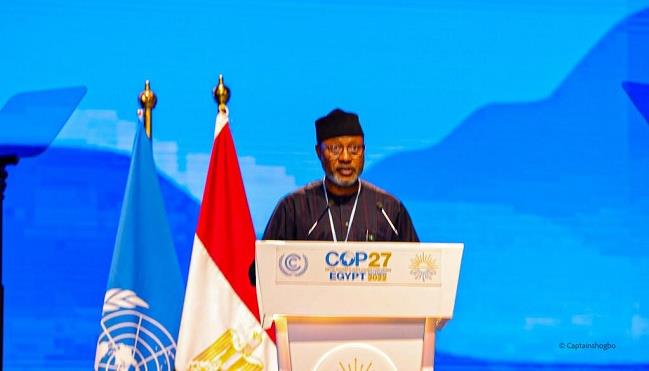The Nigerian government says it is engaging the G7 to request the inclusion of the country in the G7’s Climate Partnership List for the Co-creation of a Just Energy Transition Partnership.

President Muhammadu Buhari stated this on Tuesday, November 15, 2022, at the high-level segment of COP27 taking place in Sharm El-Sheik, Egypt.
The Nigerian leader, who was represented by the Minister of Environment, Mohammed Abdullahi, also reiterated that Nigeria and Africa needed an effective and sustainable framework.
He said that it would also address the socio-economic effects on energy transition including poverty, loss of jobs and improved livelihoods.
“Africa contributes about three percent of global emissions, but it is left to cope with the devastating impact of climate change. Nigeria has spare headed initiatives aimed at recovery of degraded land for the Sahara and Sahel region such as the Great Green Wall,” he said.
President Buhari said that there was need to expand existing acceleration programme for developing countries.
“The economic cost for Loss and Damage for Africa is estimated at almost two trillion Dollars excluding non-economic losses. Developed nations must not ignore the demand from developing nations to establish a Loss and Damage finance facility to help developing nations recover from the adverse effects of climate change, particularly the devastating floods worsening desertification and rising sea levels,” he stated.
The Nigerian leader also noted that the government was taking a bold step towards pioneering innovative climate finance instruments such as Debt for Climate swaps and also championing the development of the African Carbon market initiative.
“In support of this, Nigeria has enacted the Climate Change Law alongside the initial governance framework and launched the Nigeria Emission Trading Scheme. We have made significant progress in creating the enabling polices and incentives to advance shortlist of priority projects, including renewable Solar Independent Power Plants IPPs, scaled Decentralised Renewable Energy (DRE), projects and gas flare commercialisation opportunities,” the President said.
At COP26 in Glasgow in 2021, President Muhammadu Buhari had announced Nigeria’s commitment to net zero by 2060 on the basis of a detailed Energy Transition Plan ETP.
The plan is said to be the first of its kind in Africa, and which highlights the significant scale of resources required to attain both development and climate ambitions by 2060.
